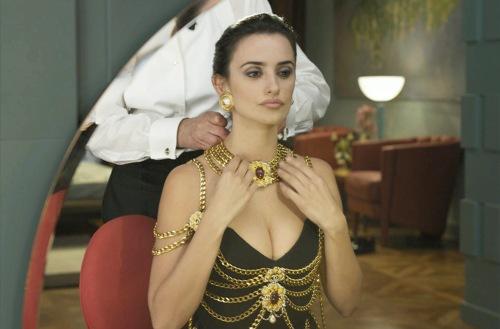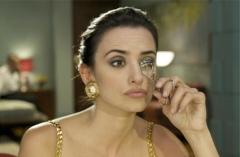
In the summer of 1989, I spent several weeks in Madrid. It was my first time out of the United States, and I was overwhelmed by the shock of difference: the life-giving daily approach to time; the ghost dregs of imperial supremacy; the post-Franco traces of bleak limbo that were thankfully almost done eroding; the particular charisma, not quite the same as what I had absorbed from so far away, in books and movies, as “European charm.” There was a pop soundtrack to that summer, an album that had come out months earlier but was still at its viral peak. One addictive song especially spilled out of windows onto plazas, with a stately beat and a girlish voice recalling (from the male point of view) an affair with a woman described as half-finished, with the body of a gypsy and “an eye here, a tooth there.”
Only recently did I realize that the video to this song, corny and glorious with late ’80s hair, helped launch a very young Penelope Cruz as a star. In America, several of Cruz’s films in the 1990s, such as Belle Epoque, did well on the art house circuit. But it was over the last decade that Cruz won more commanding stature as an international actress by working on stronger projects in Europe than she was being offered in the States, not infrequently with Spain’s leading director Pedro Almodóvar.
Cruz’s acting can be fierce, earthy, or kittenish as required. But in any of these modes, with her beauty she often seems in old-fashioned ways a bulls-eye for the audience’s gaze. A sequence in Almodóvar’s new film, Broken Embraces, makes explicit her link to arch-browed movie stars of the past. In the scene, she is preparing to shoot a movie, and her hair and makeup are done to look like familiar faces. Not only does she evoke Audrey Hepburn, she evokes Hepburn in two distinct phases—the short-banged gamine of the 1950s, and the wearier soul with the sleek updo from Breakfast at Tiffany’s. Finally, Cruz tries out a loosely waved Marilyn Monroe wig. She easily pulls off the glamor. But Broken Embraces shows Almodóvar in a rather Hitchcockian mode of controlled play, opaque and melancholy psychological ripples, and intermittent threat. This is a world in which the warm spontaneity of a Marilyn Monroe would not have wide room to breathe.
Broken Embraces is a sometimes distant film that gains immediacy from Almodóvar’s supremely confident visual style and the rush of its stories inside stories. Especially in the first hour, his lifting of the lid off each new Petrushka doll gives palpable pleasure to the audience. The overarching tale concerns an unattached middle-aged film-director-turned screenwriter (Lluis Homar), whose fate interests us even as he seems too self-contained to manifest much personality. As we observe this man in his Madrid apartment in 2004, he hints in voiceover at mysteries we hope the film will further explain. How and why did he suddenly go blind? And why, when he became a screenwriter, did he change his symbolic enough given name, Mateo Blanco, to the noir pastiche “Harry Caine”?

Soon the film has jumped sideways and back in time to the story of Cruz’s character. When we first meet Lena, short for Magdalena, it is the early 1990s. She is working as secretary to a powerful Chilean businessman in Madrid, and she is consumed with worry for her father, who is in need of medical care. Her physically slight, older, imperious boss (neatly played by Jose Luis Gomez) is disturbing in his patriarchal grip on his surroundings, and both predatory and pathetic in his lust for Lena; for noir layering, we know from a glimpse of the 2004 newspaper that he will end up in jail for shady dealings, and later dead. In these early scenes, Lena seems many things at once. She is a loving and faithful innocent, a natural secret keeper, a capable vendor of her body, a survivor in a corrupt, unjust society.
A few years later, the stories have intersected. Lena, now the businessman’s bejeweled mistress, wants to become an actress. The businessman will finance the successful director Mateo Blanco’s anticipated new film if she stars. The director and his stunning if not overwhelmingly talented leading lady fall in love. To meet, though, they must evade detection by the businessman’s gay son, a soul diminished enough by the loathing of his homophobic father to carry out that father’s command to spy on the lovers in the guise of a behind-the scenes “Making of…” documentary about the film project.
Around halfway through the film, the themes of voyeurism and doomed love have lost some gut urgency and become stylish commentary on the methods and modes of cinema itself. The slate-colored beaches of Lanzarote have a sadness underlined by a scene from Rosselini’s Voyage in Italy, which they watch on TV; and there are more fleeting hints of Vertigo in Lena’s fractured self-presentations, and of Notorious in her entrapment in her lover’s house. And the movie Mateo Blanco was working on turns out to be a strange reimagining of Almodóvar’s own classic comedy, Women on the Verge of a Nervous Breakdown—the once-zany beats fall off-kilter in the atmosphere of forboding. These references work quickly, almost like dream images, supporting the changing colors and the absorbing set, both domestic and archetypal, with which Almodóvar guides our eye and mood.
Advertisement
Like several of Almodóvar’s best-loved films—All About My Mother, for instance—Broken Embraces appears to move near its close toward a note of more embracing empathy. We start to see the bigger picture. Motives are sorted out, mostly. The fallout of betrayals is revealed, the hurt and yearning behind them aired and, when possible, forgiven. A feeling of severe loss but also possible consolation returns to the forefront. If Almodóvar is far too commanding an artist for any of this to feel exactly routine, there is a certain perfunctoriness to the film’s resolution. His command throughout this film does not quite feel the same as the rebellious necessity of some of his earlier triumphs. Broken Embraces moves us with flashes of real beauty. But somehow, instead of setting up house in our memory it departs quickly and lightly when it is done.


